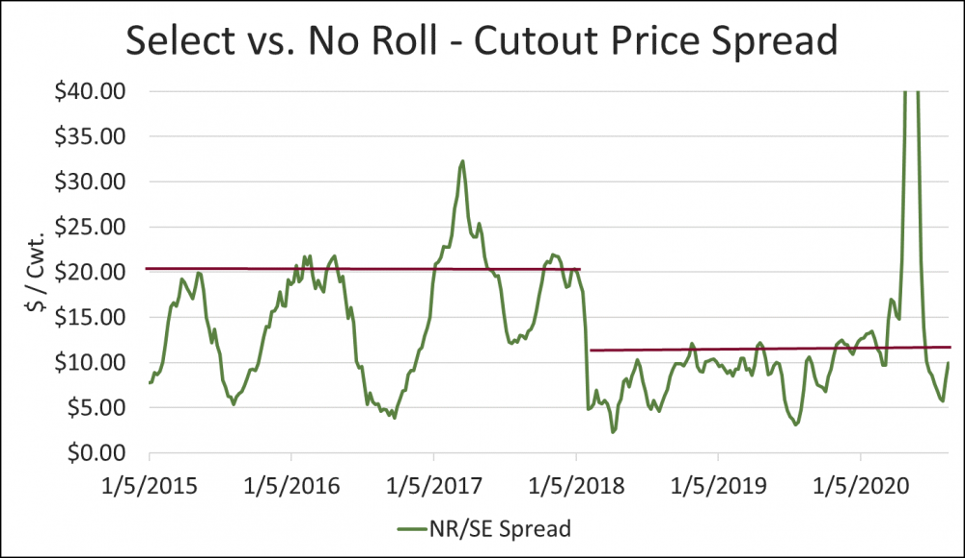Select Beef: Who Wants It?
February 4, 2021 | 3 min to read

What was exceptional yesterday is average today. That’s true in the cattle business and especially apparent in high-quality beef production.
“Without paying attention to shifts in the market, it can be easy to assume what worked when you started still works now,” says Paul Dykstra, of the Certified Angus Beef ® (CAB®) brand. “It’s hard to argue there’s ever been true demand for Select, rather than simply a price point for those indifferent to quality.”
The Choice-Select spread has been sending the message for decades, says the CAB assistant director of supply management and analysis. A wider spread signals strong demand for marbling, while a narrow spread suggests weaker demand for the same.
It gives cattlemen a roadmap of what the market wants, but price married with quantity provides the complete picture.
During the last decade, Select carcass production fell 50% in relation to Choice and Prime. Through December 2020, the Select proportion was 13.9% of fed-cattle carcasses, down from the 2019 average of 16.9%. The Select grade typically comprised nearly half of fed beef 15 to 30 years ago.
“Supplies have dramatically decreased, and so we might assume scarcity would spur prices higher, given healthy demand,” Dykstra says, “But the numbers tell a different story.”
A two-year snapshot of the spread between Select and No-Roll (ungraded, practically devoid of marbling) shows a narrowing trend, with the exception of the erratic markets this past May (Figure 1). The value difference between No-Roll and Select typically hit its highs at $20 per hundredweight (cwt.) from 2015 to 2018, but those peaks dropped to $12/cwt. after that. The lows in the comparison were also slightly lower in recent years

On the flip side, the Choice-Select spread showed a widening trend (Figure 2) even as Choice supplies increased and Select decreased.
“There’s less demand out there for Select beef. Retailers have embraced higher marbling, in part because it’s easier to procure,” he says.
Choice has surpassed 70% of the fed-cattle supply. CAB often makes up 20% of the total, while Prime reached as high as 12% last year.
“Consistent, high volumes of high-quality beef is key to retailers’ ability to feature it week in and week out,” Dykstra says.

In 2020, the percentage of fed cattle reaching premium Choice and Prime came to more than 40%. CAB hit its fifth year above a billion pounds, yet “based on the CAB to Choice cutout, demand is exceptional,” he says. “And that happened while a significant portion of foodservice and international business was sidelined due to COVID-19.
“As demand for quality continues to increase, both domestically and abroad, Select starts to find itself in a bit of a ‘no man’s land.’”
It’s no longer the low-price option when compared to product from other countries such as Mexico, Brazil and Australia, and it lacks the quality and performance compared to domestic Choice and Prime.
“With Select product devalued to this extent and representing a shrinking category, we need to embrace the change,” Dykstra says.
Hitting 100% Choice on loads of cattle isn’t the gold standard it once was, he adds. Low Choice is no longer a premium product, but merely the low-water mark once anchored by the Select grade.
“The market gives us a pretty clear picture of where it’s headed, and all cattlemen have an equal opportunity to respond,” he says.
